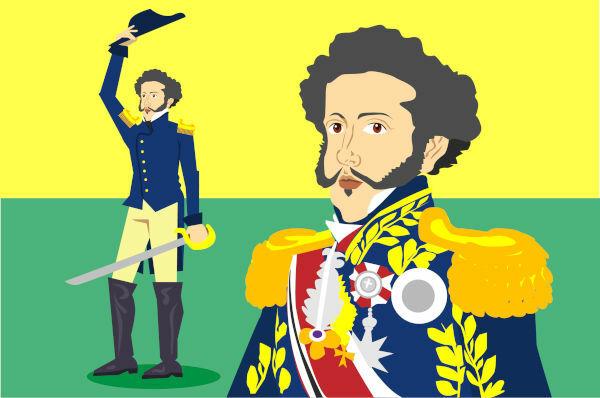O day of stay it happened on January 9, 1822, at Paço Real, in Rio de Janeiro, and, on that day, d. Peter, regent of Brazil, announced that he would not return to Portugal, as demanded by the Portuguese Cortes. It was a remarkable event for the development of the process of independence of Brazil.
Accessalso: Five fun facts about the independence of Brazil
What was Fico Day?
Firstly, the Day of Fico took place in January 9, 1822, and, on that day, the then regent of Brazil, d. Pedro, son of the Portuguese emperor d. João VI, publicly announced his intention to disobey to the order of the Portuguese Cortes for him to return to Lisbon.
![Royal Palace, where d. Pedro announced his stay in Brazil on January 9, 1822.[1]](/f/09c6f3a40798c6b6b084ae26b2106266.jpg)
Supposedly, on that day, d. Peter would have said the following words:
“As it is for the good of all and the general happiness of the nation, I am ready; tell the people I'm staying.”
The officialization of the permanence of d. Pedro in Brazil was the realization of a whole mobilization of the elites of the center-south of Brazil so that the conductor would not return to Portugal. This mobilization was centered on the
Resistance Club.Members of this group mobilized people in the provinces of São Paulo, Minas Gerais and Rio de Janeiro, held a petition and they used people close to the conductor to pressure him to choose to stay. On January 9, 1822, d. Peter was in the Royal Palace, when he received a document containing eight thousand signatures asking him to stay.
After that, he supposedly announced the famous phrase. Brazil's independence process gained strength after this event, and the acts of d. Pedro in relation to the Cortes and Portugal indicated break.
How important is the Day of Fico?
Dia do Fico may seem like a simple event and without much repercussion, but this announcement was something extremely important in the eyes of the Brazilian elite of the beginning of the 19th century. That's because what was at stake were the economic interests of this elite, which has prospered since the Portuguese royal family moved to Brazil, at the end of 1807.
Since the royal family settled in Rio de Janeiro, a series of changes have taken place, starting with the opening of ports for friendly nations. This allowed Brazilian merchants to trade with nations other than Portugal, which implied an expansion of activity.
Many other changes took place in the country demonstrating that, gradually, Brazil ceased to be a Portuguese colony and became part of the Kingdom of Portugal. This started to change with the Liberal Revolution of Porto, 1820. This revolution started to require a series of changes in Portugal, such as the return of the royal family to Lisbon.
After d. João VI returned to Portugal, the target of the time was d. Pedro, son of the king and regent of Brazil. It turns out that the return of d. Pedro for Portugal would be the realization of the recolonization project that the Cortes, which emerged in Portugal after 1820, defended. The Brazilian elites feared, therefore, this recolonization and began to see in the permanence of d. Peter one way to resist the intentions of the Courts.
Accessalso: Marquesa de Santos, the best known extramarital affair of d. Peter I
Context of the Day of Fico
Fico Day and its consequences are related to the Brazil's independence process. We can consider that the official starting point of the rupture took place on January 9, when d. Pedro decided to disobey the Portuguese Courts, but the wear and tear of relations between Brazil and Portugal it was in progress since 1820.
As we have seen, a series of transformations began to take place in Brazil, with the coming from the royal family Portuguese to here, between 1807 and 1808. The reasons for this transfer are related to the ongoing conflicts in Europe due to the rivalry between the Napoleonic France and the United Kingdom. Portugal was invaded for not respecting the terms of the Continental Lock.

In Brazil changes happened, because it was necessary modernize the country while the royal family was here. This situation displeased the Portuguese elites, and this became evident after the Porto Liberal Revolution of 1820. The Portuguese Courts were formed and the king's return was demanded, with the imposition of a monarchy constitutional in Portugal and the recolonization of Brazil.
It was the interest of the Portuguese Cortes in recolonizing Brazil that distanced the elites here from those in Portugal. D. Pedro, as regent, came to be seen as the ideal leader to lead the process of independence in Brazil, and monarchy became the ideal model to conduct this separation because it would not cause major disruptions in Brazil. In September 7th, d. Pedro declared Brazil's independence while traveling to São Paulo.
Image credits
[1] A.PAES and Shutterstock
By Daniel Neves
History teacher
Source: Brazil School - https://brasilescola.uol.com.br/historiab/9-de-janeiro-dia-do-fico.htm

